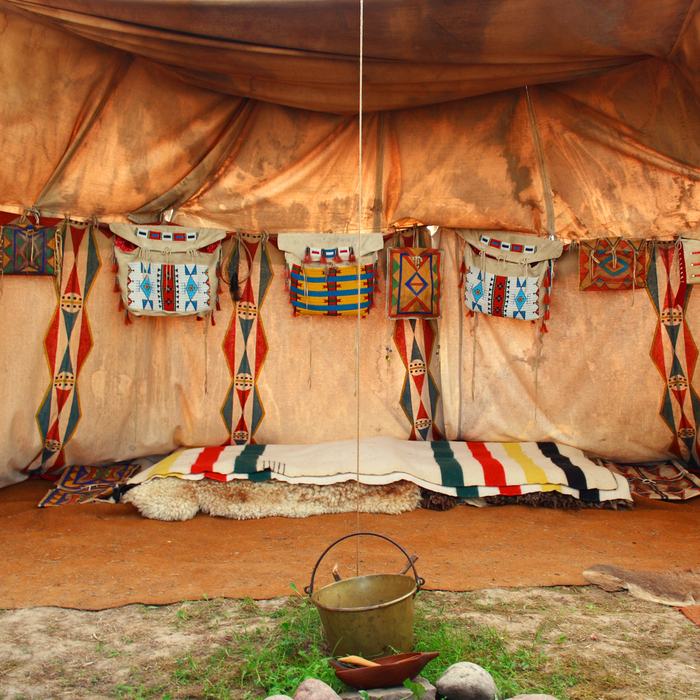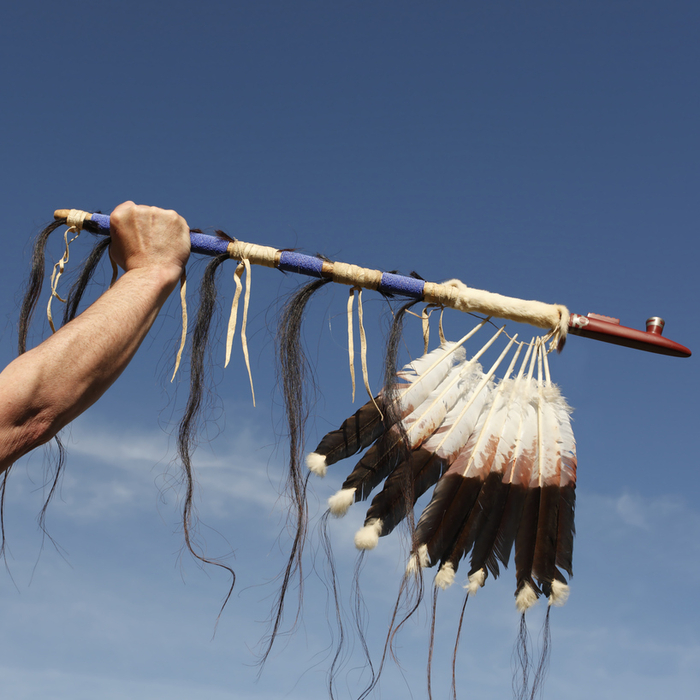I am a Native American who has been locked up in the federal Bureau of Prisons (BOP) for the past 20 years. I was raised in Mississippi by my grandmaw, who was full-blooded Choctaw from the Indian Ridges area in Alabama. She married out of the Choctaw Nation, to my white Grandpaw Skinner. Thus, I am technically only 24.9% Native American, and I look like a white boy. And while I was raised hunting and fishing and knew about my roots, it wasn’t until I got to federal prison that I really identified with my heritage. What a strange turn of events…
My awakening
Being locked up ignited my cultural connection because I saw just how harshly Native American Brothers are treated. I heard the cops [guards] mock the Brothers when they went to the laundry department to exchange their blankets for clean ones (the cops sarcastically asked if they were sure they wanted a blanket, referring to the fact that the U.S. government used to give Natives blankets that were infected with yellow fever). When we were on the compound, the cops mocked their “pretty” bandannas because they have pink in it. Even the chaplains at religious services made sly remarks when walking the Brothers to the outside worship area, complaining that “this stuff is stupid and a waste of time.” Well, it may seem stupid to others, but this is how Native Americans pray to their Creator.
So, it wasn’t long after I was first incarcerated that I started to further explore and identify with my Native roots. Seeing and hearing all these racist slurs compelled me to get step up and be counted as one of them. My Brothers needed me.
Putting my skills to work
One thing I have learned over these years behind bars is the law, and I can write these cops up like no other. They literally beg and bribe me to stop. I tell them, “Look, they gave me 40 years for thinking about doing a crime and you’re harassing me with no regard for the law! Hell, no I’m not backing off. In fact, I’m reporting you for attempting to bribe me!” They hate me now, but the feeling is not mutual. This isn’t personal …It’s “business”!
Native Americans are the most harshly treated of all the nationalities. I wish I had a smartphone so I could film these BOP employees and let you see and listen. But I don’t, and you can’t, so I put my pen and typewriter to work. I have filed a lawsuit in California, Skinner v. R. Lee et. al. (5:19-cv-01116-DMG-ADS Los Angeles Div.), against 17 BOP employees, charging them with a RICO civil conspiracy to obstruct the due administration of justice (retaliation, assault with battery, conspiracy to commit said offenses and violation of rights). The district court threw it out as frivolous, but on appeal, the Ninth Circuit reversed that finding and has appointed a pro bono law firm to represent me. The issue I believe caught the court’s respect is my argument that due to lack of a specific definition of “person” and “state,” the Civil Rights Act allows any individual who violates the covered rights to be sued, including employees of federal prisons. If I win, this is what I want: body cams on every single BOP employee, so they can be held accountable for their abuse.
Such a victory would benefit everyone in federal prison, because in my heart, we are all Native Americans. Most prison staff members are what we call “colored scared”; they lump everyone who isn’t “white” together, so they don’t piss off the Blacks. Thus, prison staff will say that a unit has 56% blacks and 44% whites, when in reality it includes 15 white men, three Indians, 40 Mexicans and 70 Blacks.
Sending our prayers to our Creator
Getting back on track…We worship once a week, for the whole day, rain, sleet or shine. But if the designated day for Native American worship is a Thursday and it’s foggy (thus making it hard for the cops to see), the prison radios are down or staff are having a pig roast on the yard, we don’t get to pray. And since the pandemic hit two years ago, we haven’t been allowed to pray hardly at all. That weighs heavily on the heart.
We spend our worship time in a sweat lodge. We build a big fire, with 56 rocks inside that we call our “grandfathers.” The fire burns until the grandfathers are red hot. Then we gather inside the wigwam (a domed hut), which is covered with tarps. Whoever is “running the rocks” (bringing our grandfathers into the wigwam on a shovel), carries the first seven in, one at a time. Then he brings seven more (14 grandfathers per round). One of the Brothers uses deer antlers to place the rocks in a hole in the center of the wigwam. Usually, there are 10 to 15 Brothers inside the wigwam. The “rock runner” closes the door and it’s pitch black inside, other than the grandfathers glowing red hot.

The Brother running the ceremony has a five-gallon bucket of water containing a buffalo horn. As it is passed from left to right, we share our thoughts and prayers. The Brother who has the bucket empties the five gallons of water, one buffalo horn at a time, onto the grandfathers. The steam causes the wigwam to become extremely hot. We usually sing three songs during each round of the bucket. This proceeds throughout the day.
Afterward, we smoke a pipe. Native Americans are one of two religious groups in the BOP allowed to smoke tobacco. We believe that for our prayers to be heard, one of us must smoke a ceremonial pipe. As it rises, the smoke carries our prayers, which are then accepted by the Creator.
This service usually lasts from 7:30 a.m. until 2 p.m. Then we clean up and head back to our prison cells.
Unintended consequences
Being in the outside worship area is the only time I feel free. Even though we’re still locked inside of a fence with guard towers, it feels as if the walls disappear. All our pain and suffering ends in that one day, once a week. But there is another “gift” from the federal government: By mass incarcerating us, the government, our occupier, has brought us together from every Nation. We come together and a bond is forged. The numbers in our circle grow with every incarcerated Brother. Networking is our greatest strength.
And one of these days, when we are free, we will come together out there in the world, and we will rise above our oppressor and this oppression.
May the Creator be with each of you as we journey down this yellow brick road!




